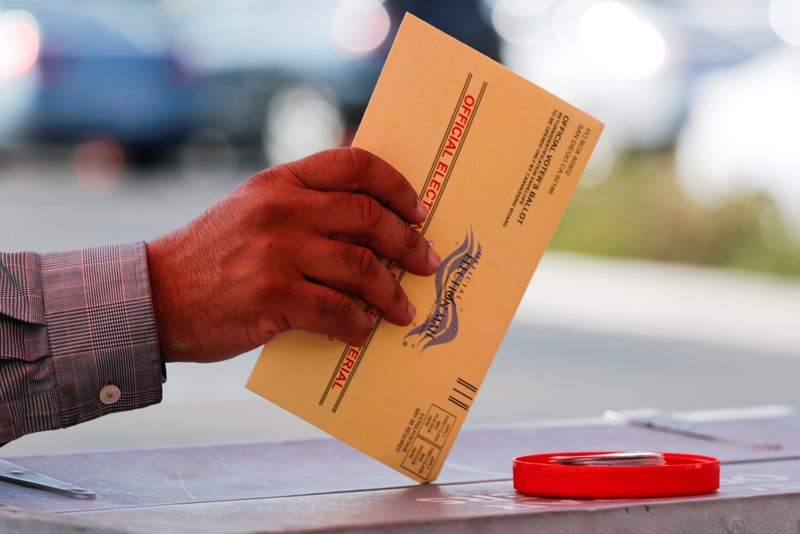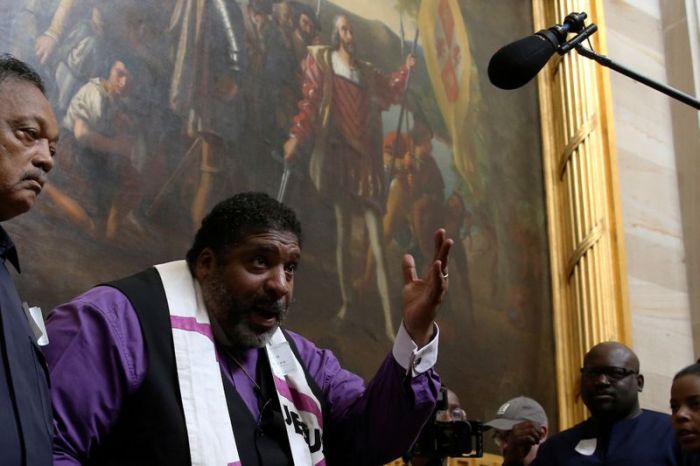WASHINGTON (Reuters) – The drive to expand vote-by-mail options during the coronavirus pandemic has emerged as the centerpiece of a growing political fight ahead of November’s election.
President Donald Trump and his Republican allies have attacked the idea of expanding mail balloting, arguing it is vulnerable to fraud and openly worrying that easier voting would hurt their party’s chances in November.
Democrats and voting rights groups say it is a way to protect voters from the deadly virus, and that a failure to guarantee that option amid a pandemic will disenfranchise millions of Americans, especially the poor and African Americans who are deemed more vulnerable to the virus and who tend to vote Democratic.
Last week’s turbulent Wisconsin elections, which went ahead after Republicans blocked Democratic efforts to delay in-person voting and expand absentee balloting, illustrated the partisan divide – and the mounting urgency to find a solution before the Nov. 3 U.S. election.
Here are key issues surrounding the vote-by-mail debate.
WHAT’S BEHIND REPUBLICAN OPPOSITION?
Republicans say voting by mail is more susceptible to fraud since voters do not have to appear in person at a polling place.
“Mail ballots are a very dangerous thing for this country because they’re cheaters. They go and collect them. They’re fraudulent in many cases,” Trump told a recent coronavirus briefing, without providing evidence. He acknowledged he cast an absentee ballot by mail last month in Florida’s Republican primary.
But Trump also voiced what Democrats believe is the prime motivation for opposing vote by mail: It will lead to a higher turnout that hurts Republican candidates.
Trump told Fox News a shift to making voting easier would mean “you’d never have a Republican elected in this country again.”
Trevor Potter, a Republican former chairman of the Federal Election Commission who founded the Washington-based Campaign Legal Center, said Trump’s reaction was puzzling since Republicans often do well in mail-in balloting.
“Polls show older Americans, those thought to be most vulnerable to the virus, are more likely to support President Trump than other voters,” Potter said, adding conservative Utah is one of five states that has gone to all-mail voting with little sign of fraud.
IS FRAUD REALLY A CONCERN?
A series of academic, government and news investigations over the years have found little evidence of election fraud of any kind. Utah and four other states that vote entirely by mail – Hawaii, Oregon, Washington and Colorado – have reported little fraud.
Trump, who has often said without evidence that millions voted illegally in 2016, formed a commission after the campaign to investigate. It disbanded in January 2018 without finding any evidence to back up his allegations.
Election experts say there have been scattered incidents of people collecting and manipulating absentee ballots in a process known as “ballot harvesting.”
The most recent example came in a 2018 North Carolina congressional race, the outcome of which was overturned when it was determined an operative gathered ballots for the Republican candidate.
ARGUMENTS FOR VOTING BY MAIL?
More than a dozen states already have postponed primaries or expanded vote by mail to avoid forcing residents to go to crowded polling places.
Vote by mail is hardly a novelty. A report by the U.S. Election Assistance Commission says the process was used by about one-quarter of all voters in the 2018 midterm elections.
Along with the five states that vote entirely by mail, 28 states will allow voters to request a mail ballot without any excuse in November, according to the Brennan Center for Justice.
“We are not reinventing the wheel here. This is upscaling what is already taking place,” U.S. Senator Ron Wyden, co-sponsor with fellow Democratic Senator Amy Klobuchar of a bill to expand vote by mail and early voting to all states, told reporters last week.
WHAT ARE THE HURDLES?
There are still 17 states such as Texas, New York and Louisiana that would need to change their policies to guarantee that everyone who wants to vote by mail in November can, the Brennan Center said.
It will be expensive. The Brennan Center estimated the cost of ensuring that vote by mail was available for all voters could be up to $1.4 billion, with postage alone costing up to $600 million.
Even advocates of vote by mail say states would need to keep the option of in-person voting, for voters with disabilities, those who need language access assistance or do not have regular mail access.
WHAT ARE THE KEY LEGAL BATTLES?
Democratic and Republican-aligned groups across the country are already fighting in federal and state courts over whether and how to expand access to mail-in voting.
On March 30, 27 New Mexico county clerks petitioned the state Supreme Court to conduct their June 2 primary almost entirely by mail and allow all voters to be mailed an absentee ballot. State Republicans sued to oppose both changes.
In Texas, the Democratic Party sued the state’s Republican leadership in federal court on April 7 to allow no-excuse absentee voting. Texas law requires voters to provide an excuse, such as disability, when requesting an absentee ballot.
In Georgia, the American Civil Liberties Union sued the Republican secretary of state last Wednesday in federal court for requiring voters to pay their own postage when submitting mail-in absentee ballots and applications, arguing that was tantamount to a poll tax.
(Reporting by John Whitesides and Julia Harte; Editing by Soyoung Kim and Peter Cooney)

























